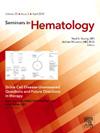骨髓增生异常综合征患者的感染和抗菌药预防。
IF 4.1
3区 医学
Q1 HEMATOLOGY
引用次数: 0
摘要
感染并发症是骨髓增生异常综合征(MDS)患者发病和死亡的重要原因。预防感染可以大大提高生存率和生活质量。遗憾的是,由于每份出版物所包含的疾病具有异质性、定义随时间而变化以及缺乏标准化的预防措施,因此对 MDS 患者的感染和抗菌药物预防措施的评估并不全面。尽管存在这些局限性,但还是可以做出一些基本说明。MDS 感染与中性粒细胞减少症有关。与高风险(HR)MDS 患者相比,低风险(LR)MDS 患者的感染率较低,这可能与两组患者中性粒细胞减少的患病率不同有关。肺炎是最常见的感染,细菌是最常见的病原体。侵袭性真菌感染(IFI)并不常见。潜伏病毒再活化的情况很少见。在现有数据有限的情况下,我们一致认为,HR-MDS 患者在严重中性粒细胞减少和治疗早期周期最容易发生感染时,可以考虑使用抗菌药物进行预防。鉴于中性粒细胞减少症和病毒再活化的发病率较低,针对这些病原体的抗菌预防性治疗对大多数患者来说不太有利,但针对霉菌的抗真菌预防性治疗常用于持续性深度中性粒细胞减少症患者。最终,需要改进有关感染和抗菌药物预防的数据收集工作,以改善对 MDS 患者的护理。本文章由计算机程序翻译,如有差异,请以英文原文为准。
Infections and antimicrobial prophylaxis in patients with myelodysplastic syndromes
Infectious complications are an important cause of morbidity and mortality in patients with myelodysplastic syndromes (MDS). Preventing infections could significantly improve both survival and quality of life. Unfortunately, both infections and antimicrobial prophylaxis in patients with MDS are incompletely assessed due to the heterogeneity of disorders included in each publication, changing definitions over time, and lack of standardized prophylaxis practices. Despite these limitations, some basic statements can be made. Infections in MDS are associated with neutropenia. Patients with lower-risk (LR) MDS tend to have fewer infections compared to patients with higher-risk (HR) MDS, which may be related to the different prevalence of neutropenia in the 2 groups. Pneumonia is the most common infection, and bacteria are the most common pathogens. Invasive fungal infections (IFI) are uncommon. Reactivation of latent viruses are rare. With the limited data available, we agree that antibacterial prophylaxis can be considered in patients with HR-MDS during severe neutropenia and early cycles of therapy when infections are most likely to occur. Given the low prevalence of IFI and viral reactivation, antimicrobial prophylaxis for these pathogens is less likely to be advantageous for most patients, although antifungal prophylaxis with activity against mold is commonly used in patients with persistent, profound neutropenia. Ultimately, improved data collection regarding infections and antimicrobial prophylaxis is needed to improve care for patients with MDS.
求助全文
通过发布文献求助,成功后即可免费获取论文全文。
去求助
来源期刊

Seminars in hematology
医学-血液学
CiteScore
6.20
自引率
2.80%
发文量
30
审稿时长
35 days
期刊介绍:
Seminars in Hematology aims to present subjects of current importance in clinical hematology, including related areas of oncology, hematopathology, and blood banking. The journal''s unique issue structure allows for a multi-faceted overview of a single topic via a curated selection of review articles, while also offering a variety of articles that present dynamic and front-line material immediately influencing the field. Seminars in Hematology is devoted to making the important and current work accessible, comprehensible, and valuable to the practicing physician, young investigator, clinical practitioners, and internists/paediatricians with strong interests in blood diseases. Seminars in Hematology publishes original research, reviews, short communications and mini- reviews.
 求助内容:
求助内容: 应助结果提醒方式:
应助结果提醒方式:


